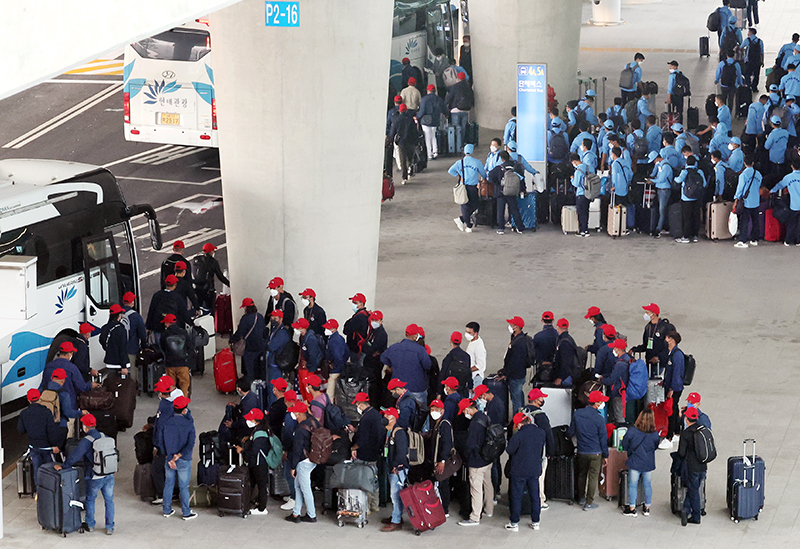[Newsmaker] Foreign workers fluent in Korean to receive visa extension benefits
By Jung Min-kyungPublished : Dec. 30, 2022 - 15:23

Foreigners working in South Korea on an E-9 visa with a high command of the Korean language will likely be allowed to stay in Korea continuously for up to 10 years.
According to a plan announced Friday by the Ministry of Employment and Labor, the Employment Permit System will be revised to give benefits to foreign laborers who are fluent in Korean. Currently, holders of the E-9 nonprofessional work visa wishing to extend their stay after 4 years and 10 months must leave Korea and reapply for the same visa in their home country.
Under the envisioned change, which the ministry aims to introduce as early as next year, eligible workers should stay with the same employer for at least 30 months, if in the manufacturing sector. If in non-manufacturing sectors, the minimum requirement is 24 months.
Their proficiency in Korean should be proven by a high score in the state-run Test of Proficiency in Korean, or TOPIK. In addition, the applicants must also complete the Korea Immigration and Integration Program, which is a state-run immigrant education program.
On top of stay extension benefits, the ministry plans to allow E-9 visa holders to work in more diverse industries including cargo handling, waste disposal, fresh produce and tobacco brokerage.
The move comes as the government seeks to expand the quota for E-9 visas from the current 69,000 to 110,000 in 2023.
The E-9 visa is one of the two pillars of South Korea’s Employment Permit System, introduced in 2004 to address a chronic labor shortage. It is currently available to workers from 16 countries including Vietnam and the Philippines.
"Local industries are struggling with a lack of workers with no change in the current EPS system for the past two decades," Park Jong-pil, head of the labor ministry’s planning and coordination office said.
"The latest announcement is in line with our plan to help local companies that need a foreign workforce, while simultaneously boosting our labor market," he added.
According to a plan announced Friday by the Ministry of Employment and Labor, the Employment Permit System will be revised to give benefits to foreign laborers who are fluent in Korean. Currently, holders of the E-9 nonprofessional work visa wishing to extend their stay after 4 years and 10 months must leave Korea and reapply for the same visa in their home country.
Under the envisioned change, which the ministry aims to introduce as early as next year, eligible workers should stay with the same employer for at least 30 months, if in the manufacturing sector. If in non-manufacturing sectors, the minimum requirement is 24 months.
Their proficiency in Korean should be proven by a high score in the state-run Test of Proficiency in Korean, or TOPIK. In addition, the applicants must also complete the Korea Immigration and Integration Program, which is a state-run immigrant education program.
On top of stay extension benefits, the ministry plans to allow E-9 visa holders to work in more diverse industries including cargo handling, waste disposal, fresh produce and tobacco brokerage.
The move comes as the government seeks to expand the quota for E-9 visas from the current 69,000 to 110,000 in 2023.
The E-9 visa is one of the two pillars of South Korea’s Employment Permit System, introduced in 2004 to address a chronic labor shortage. It is currently available to workers from 16 countries including Vietnam and the Philippines.
"Local industries are struggling with a lack of workers with no change in the current EPS system for the past two decades," Park Jong-pil, head of the labor ministry’s planning and coordination office said.
"The latest announcement is in line with our plan to help local companies that need a foreign workforce, while simultaneously boosting our labor market," he added.



















![[Today’s K-pop] Treasure to publish magazine for debut anniversary](http://res.heraldm.com/phpwas/restmb_idxmake.php?idx=642&simg=/content/image/2024/07/26/20240726050551_0.jpg&u=)